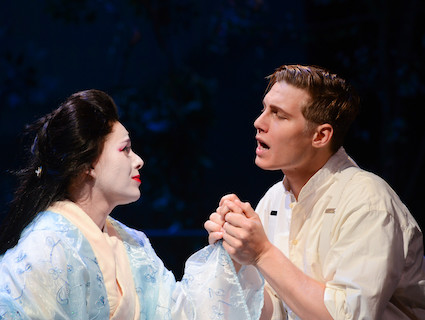The title role of Cho-Cho-San, the 15-year old geisha whose naïve love
for an American sailor ends in suicide, belongs among the most challenging
in the Italian repertoire. Any singer who dares to tackle this role
requires the stamina to remain on stage nearly continuously through almost
three hours, singing with a full range of dynamics, emotions, and textual
nuances. Puccini’s heroine is driven from child-like innocence in Act
I, to pious determination in Act II, and to wrenching anguish in Act III.
Yulia Lysenko, a Ukrainian-trained soprano but now living in the US,
approached the role with vocal virtues common among the great mid-20 th century exponents of this role: technical security, perfect
intonation, and a credibly child-like timbre. Her characterization was
heart-felt, believable and consistent—if sometimes a bit unsubtle and
not always ideally alert to the text. As essentially lyric singers of this
type often do, she struggled a bit with weightier utterances that lie lower
in her voice.
Matthew White, a recent competition-winning tenor from Virginia still
finishing up at the Academy of Vocal Arts, brought to the role a small and
well-formed young voice. His penetrating and slightly metallic tone, fine
intonation and secure high notes matched Lysenko. Yet his is most decidedly
not (yet?) the type of instrument appropriate to the role of Pinkerton.
Musically, even the reduced orchestra sometimes buried him and,
dramatically, he struggled to convey Pinkerton’s self-serving,
cowardly, arrogant and yet irrepressibly outgoing character. Even in the
days when lighter tenors like Beniamino Gigli, Giuseppe di Stefano and
Cesare Valletti customarily sang this role—something rarer
today—they did so with greater warmth and ebullience.
The smaller characters consistently excelled. Rising young American
baritone Paul la Rosa, a Juilliard graduate with an extraordinary resume of
operatic and concert performances, sang Sharpless with style, full
resonance and true stage presence—save for some thinner top
G’s. Janara Kellerman brought a resounding mezzo voice, clear diction
and convincing passion to the role of Suzuki. Her Puccini sounds like Verdi
and Wagner, in the best sense of the comparison. Wei Wu, a native of China
climbing making his way up in the US opera world, sang the Bonze, a small
gem of a Puccini role, with strength and directness. Anthony Webb showed a
typical character tenor to best advantage while hamming his way through the
role of the marriage broker Goro. Chad Armstrong and Kathleen Monson were
solid as the suitor Prince Yamadori and Kate Pinkerton. The latter, who is
largely silent while on stage, looked the part of the ice queen.
Festival Director Richard Tang Yuk led a reduced orchestra in a technically
assured performance. The conducting—while it could have been lighter,
quicker and more varied, especially in Act I—was as good overall as
has ever been heard at the Princeton Festival.
Prima la musica!
Opera has always been—and should remain—mostly about the music. Yet opera is a multi-media art form, and stage directors have
recently gained prominence. Though Puccini sentimentalized the plot of Butterfuly in many respects, it offers more
opportunities to probe beneath the surface than La Bohême, Tosca, or Turandot. Some productions return to
the harsher realism of the short story and the play on which the libretto
is based. Others invoke classical Japanese drama to stylize the action, as
does the MET’s current Butterfly. At the very least, some
accentuate the theme of cultural clash by presenting Pinkerton as
stereotypically American in his bluff but callous manner, and
Cho-Cho-San’s suicide as a return to the dignity and pride of
Japan’s deeper civilization.
Princeton’s production team chose none of these options, hewing
instead to the lowest common denominator. The production suggested that
this was all just a misunderstanding: a romance gone bad between two rather
confused young people. In this interpretation, Pinkerton seemed a bit
dim-witted: his constantly perplexed persona clashed with the jovially
impatient and authoritative naval officer of the libretto. Cho-Cho-San also
seemed clueless from beginning (where it makes some sense) to end (where it
does not). Most objectionable was the opera’s final moment, when she
fell dying into Pinkerton’s arms and tried to kiss him. After three
years of suffering, had she really learned nothing?
Sets and costumes accentuated the superficial mood. While competent enough,
were the cute little house of wood and paper, a decorative garden bridge,
and garish pink sunsets borrowed from a production of Mikado? And
does it take a professional dramaturg to note something amiss when
Cho-Cho-San approaches her wedding tatami singing about her garment of
“lily white” yet is dressed in sparkling light blue chiffon?
(Thus spoiling a lovely triple-entendre in Italian that is
encapsulates the entire plot: the world Butterfly uses,
“candido,” means not just pure white, but also
“clean” and “honest.”) Surely, a bit of serious
thought about what is in the libretto could have fixed all
this—without costing a dollar more.
With all its strengths and weaknesses, the final performance of Madama Butterfly played to a nearly full auditorium, which
responded with a standing ovation.
Andrew Moravcsik
